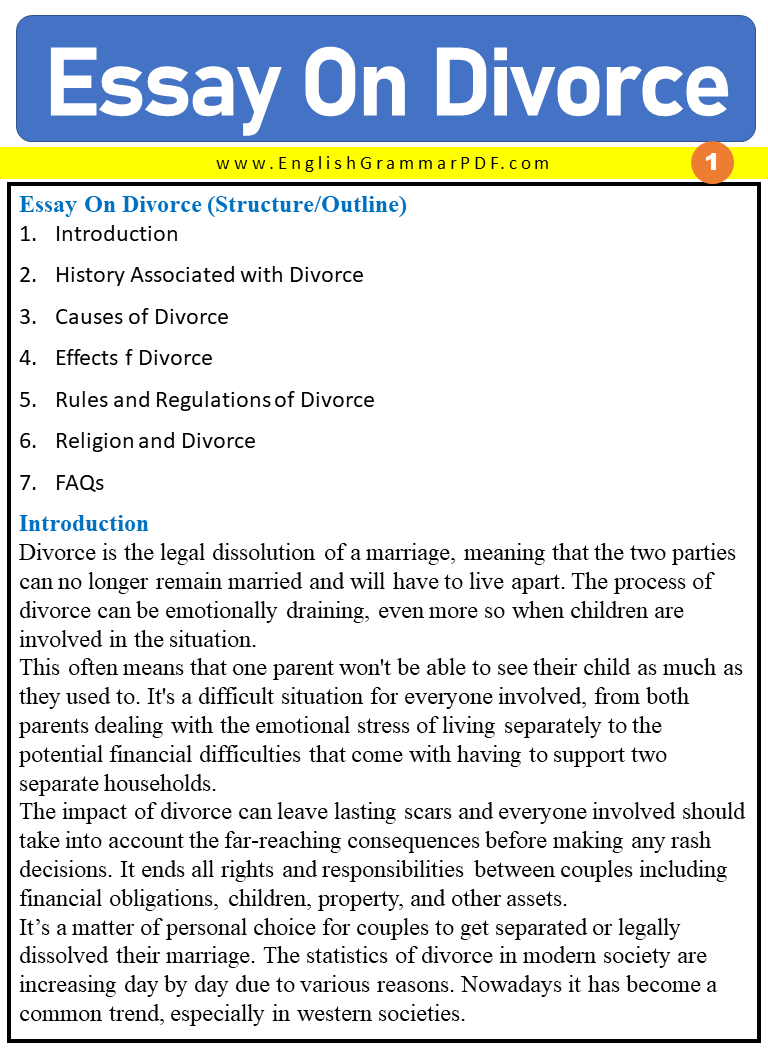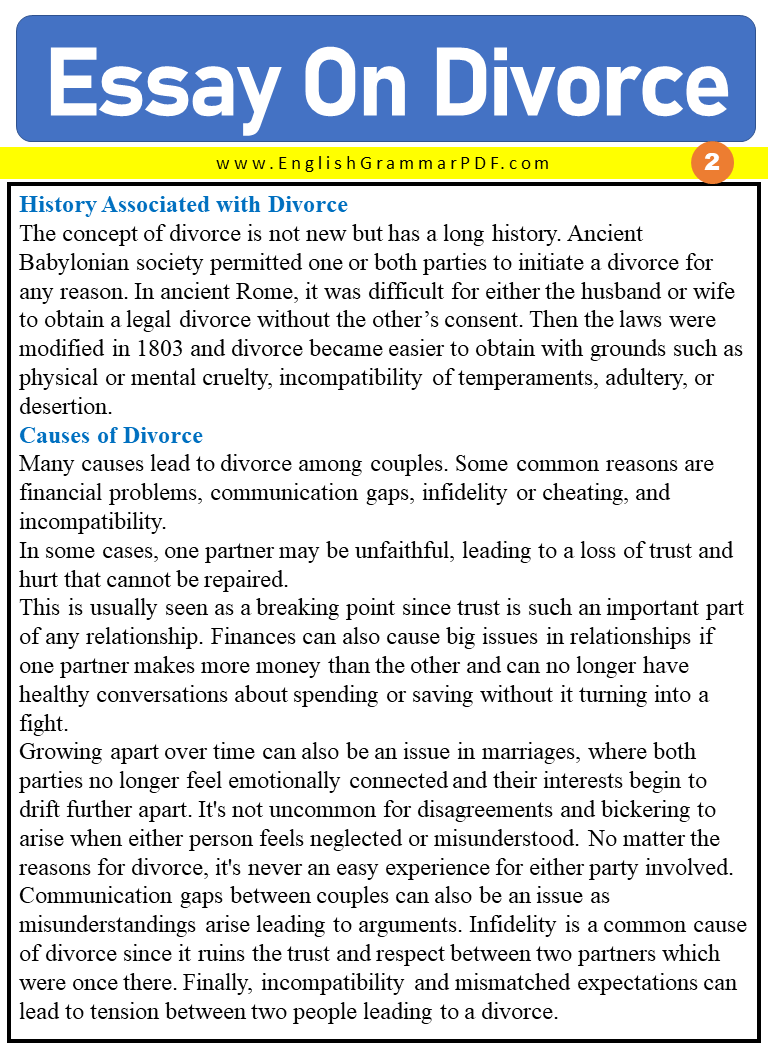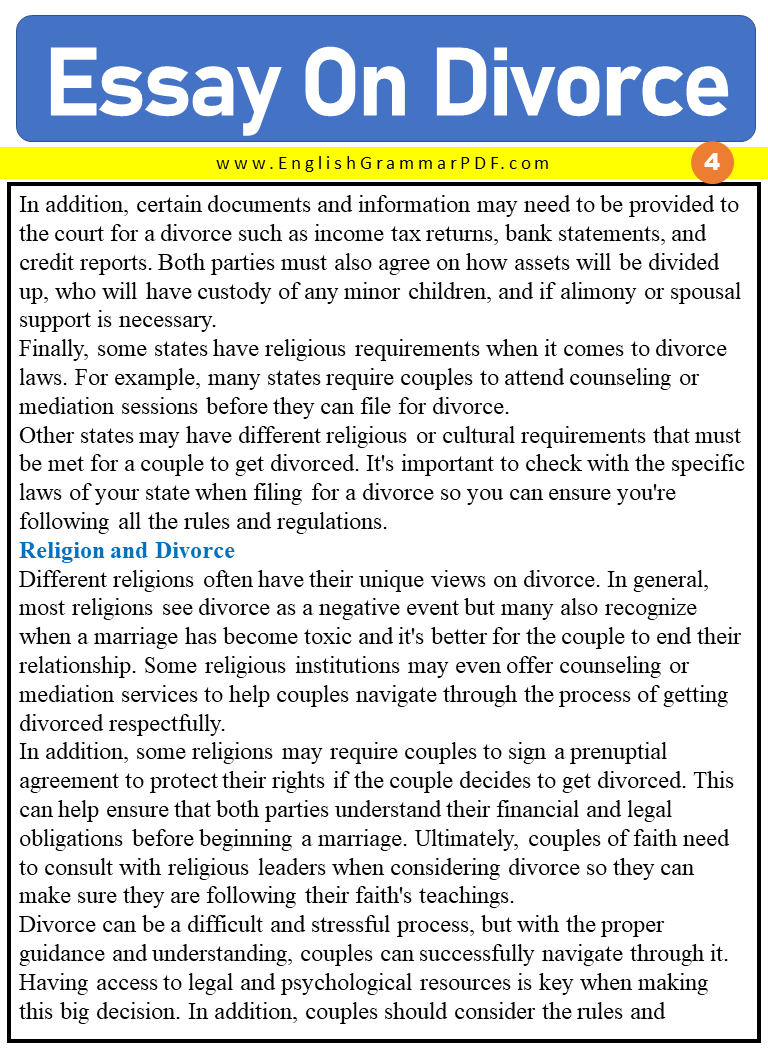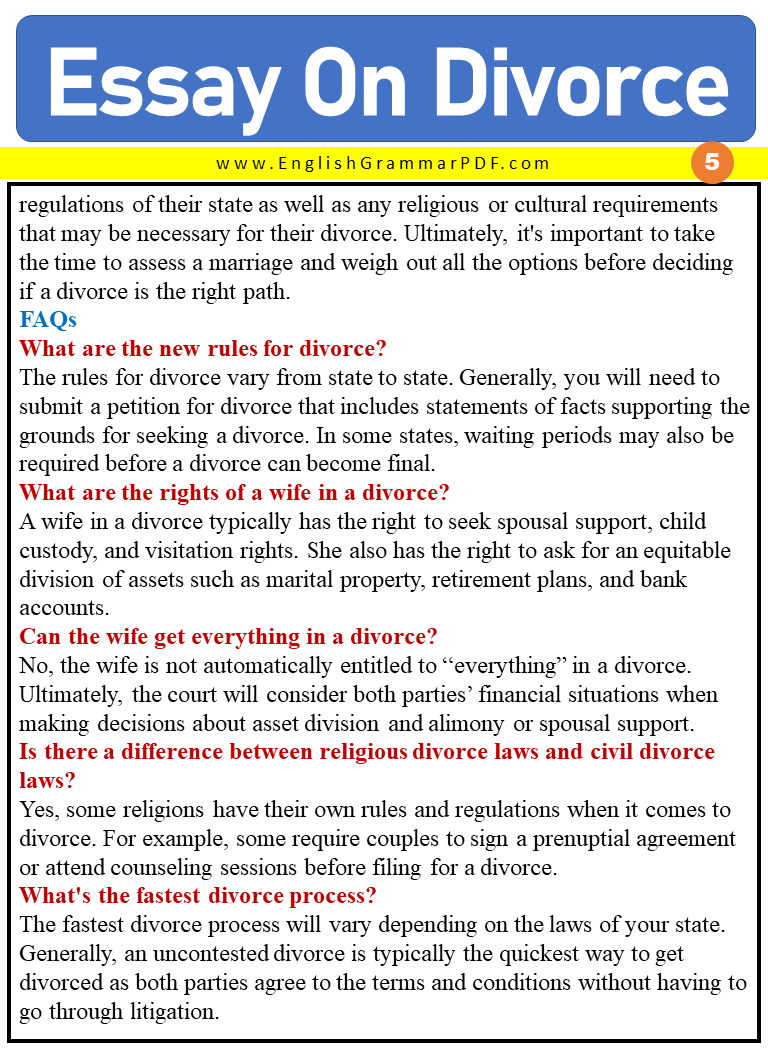Essay On Divorce (Structure/Outline)
- Introduction
- History Associated with Divorce
- Causes of Divorce
- Effects f Divorce
- Rules and Regulations of Divorce
- Religion and Divorce
- FAQs

Introduction
Divorce is the legal dissolution of a marriage, meaning that the two parties can no longer remain married and will have to live apart. The process of divorce can be emotionally draining, even more so when children are involved in the situation.
This often means that one parent won’t be able to see their child as much as they used to. It’s a difficult situation for everyone involved, from both parents dealing with the emotional stress of living separately to the potential financial difficulties that come with having to support two separate households.
The impact of divorce can leave lasting scars and everyone involved should take into account the far-reaching consequences before making any rash decisions. It ends all rights and responsibilities between couples including financial obligations, children, property, and other assets.
It’s a matter of personal choice for couples to get separated or legally dissolved their marriage. The statistics of divorce in modern society are increasing day by day due to various reasons. Nowadays it has become a common trend, especially in western societies.
History Associated with Divorce
The concept of divorce is not new but has a long history. Ancient Babylonian society permitted one or both parties to initiate a divorce for any reason. In ancient Rome, it was difficult for either the husband or wife to obtain a legal divorce without the other’s consent. Then the laws were modified in 1803 and divorce became easier to obtain with grounds such as physical or mental cruelty, incompatibility of temperaments, adultery, or desertion.
Causes of Divorce
Many causes lead to divorce among couples. Some common reasons are financial problems, communication gaps, infidelity or cheating, and incompatibility.
In some cases, one partner may be unfaithful, leading to a loss of trust and hurt that cannot be repaired.
This is usually seen as a breaking point since trust is such an important part of any relationship. Finances can also cause big issues in relationships if one partner makes more money than the other and can no longer have healthy conversations about spending or saving without it turning into a fight.
Growing apart over time can also be an issue in marriages, where both parties no longer feel emotionally connected and their interests begin to drift further apart. It’s not uncommon for disagreements and bickering to arise when either person feels neglected or misunderstood. No matter the reasons for divorce, it’s never an easy experience for either party involved.
Communication gaps between couples can also be an issue as misunderstandings arise leading to arguments. Infidelity is a common cause of divorce since it ruins the trust and respect between two partners which were once there. Finally, incompatibility and mismatched expectations can lead to tension between two people leading to a divorce.
Effects of Divorce
Divorce has many effects on individuals, families, and societies as a whole. Some of the most common effects are financial stress, emotional trauma, physical health issues, housing instability, and changes in relationships with family and friends.
Financially, individuals may experience difficult times when they are forced to support two households or even depend on their partner’s income. Emotionally, both parties involved can suffer from depression, anxiety, and other mental health issues as a result of the loss of a marriage.
Physically, stress from divorce can take its toll on one’s health, causing the individual to suffer from headaches, insomnia, and other health ailments. In terms of housing, many couples have to contend with having to find a new place to live or deciding who will get custody of their home. Lastly, divorce can lead to changes in relationships with family and friends since some may choose one side over the other.
It is important to note that divorce is never an easy decision to make and it’s important to consider all the consequences before making any big decisions. It’s also important to get proper legal and psychological support when going through this process as it affects all parties involved.
Divorce can be a challenging experience, but with the right guidance, individuals can make it through successfully and start afresh on their own. Therefore, couples need to assess their relationship carefully and weigh out all the pros and cons of getting a divorce. If you are considering a divorce, it’s also wise to seek professional counseling
Rules and Regulations of Divorce
To get a divorce, the state requires two parties to submit a petition to the court. The petition must include statements of facts that support the grounds for seeking a divorce such as infidelity or incompatibility. In some states, waiting periods may be required before a divorce can become final.
In addition, certain documents and information may need to be provided to the court for a divorce such as income tax returns, bank statements, and credit reports. Both parties must also agree on how assets will be divided up, who will have custody of any minor children, and if alimony or spousal support is necessary.
Finally, some states have religious requirements when it comes to divorce laws. For example, many states require couples to attend counseling or mediation sessions before they can file for divorce.
Other states may have different religious or cultural requirements that must be met for a couple to get divorced. It’s important to check with the specific laws of your state when filing for a divorce so you can ensure you’re following all the rules and regulations.
Religion and Divorce
Different religions often have their unique views on divorce. In general, most religions see divorce as a negative event but many also recognize when a marriage has become toxic and it’s better for the couple to end their relationship. Some religious institutions may even offer counseling or mediation services to help couples navigate through the process of getting divorced respectfully.
In addition, some religions may require couples to sign a prenuptial agreement to protect their rights if the couple decides to get divorced. This can help ensure that both parties understand their financial and legal obligations before beginning a marriage. Ultimately, couples of faith need to consult with religious leaders when considering divorce so they can make sure they are following their faith’s teachings.
Divorce can be a difficult and stressful process, but with the proper guidance and understanding, couples can successfully navigate through it.
Having access to legal and psychological resources is key when making this big decision. In addition, couples should consider the rules and regulations of their state as well as any religious or cultural requirements that may be necessary for their divorce. Ultimately, it’s important to take the time to assess a marriage and weigh out all the options before deciding if a divorce is the right path.
FAQs
What are the new rules for divorce?
The rules for divorce vary from state to state. Generally, you will need to submit a petition for divorce that includes statements of facts supporting the grounds for seeking a divorce. In some states, waiting periods may also be required before a divorce can become final.
What are the rights of a wife in a divorce?
A wife in a divorce typically has the right to seek spousal support, child custody, and visitation rights. She also has the right to ask for an equitable division of assets such as marital property, retirement plans, and bank accounts.
Can the wife get everything in a divorce?
No, the wife is not automatically entitled to “everything” in a divorce. Ultimately, the court will consider both parties’ financial situations when making decisions about asset division and alimony or spousal support.
Is there a difference between religious divorce laws and civil divorce laws?
Yes, some religions have their own rules and regulations when it comes to divorce. For example, some require couples to sign a prenuptial agreement or attend counseling sessions before filing for a divorce.
What’s the fastest divorce process?
The fastest divorce process will vary depending on the laws of your state. Generally, an uncontested divorce is typically the quickest way to get divorced as both parties agree to the terms and conditions without having to go through litigation.
Essay On Divorce (Pictures & PDF)





Related: Essay on Dentist
Below is the PDF of this Essay.


